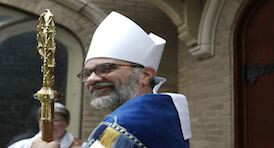Saying the Same Thing in a New Way

I am back from the House of Bishops in Detroit and the Diocese of Michigan, who showed great hospitality in a city on the rise. I continue to be impressed with our Presiding Bishop and in particular his gifts of personal relationships and encouragement. As you doubtless know, he has sought to encourage the Church by re-describing it as the “Jesus movement,” and it is this which I would like to reflect upon.
The expression is helpful in two important ways. First it places Jesus Christ himself at the center of the Church's life and thereby distinguishes Him continually from all the human traditions and institutions of which the Church consists. The idea is not new - it is really a way to speak of what the Reformers, following Paul, called “justification,” but a fresh way to say it can be good. To be sure, it is through the Church, traditions and institutions and all, that we have access to Him; “spiritual but not religious” is a mirage borne of our hyper - individualist age. But it is valuable to put first things first (and I imagine “movement” is a more appealing way to say it for many these days.
Secondly the Jesus movement is a new way to underline the properly ecumenical nature of the Church. Every community devoted to Him is related to the others – “all who are not against us are for us.” This doesn't mean that debate over what we believe and how we should relate to the world should end. But it is good to challenge our received divisions.
At the same time it is good to pose our queries to the phrase, to shore it up where necessary. The phrase is meant to be a big tent - fair enough. But it is the Jesus of the Scriptures whose movement it is, and He died for our sins and has risen from the dead to inaugurate the coming of the Kingdom. The phrase mustn't blur atonement and eschatology, the doctrine of the last things.
Another way to make my point is this: the phrase means to hearken back to the spiritual springtime, the days of the apostles. But it is a 19th century myth that the earliest days had a simpler message of Jesus the prophet and teacher alone. From the first the apostolic preaching centered on his shameful death and its vindication in His resurrection. (As the great C.H. Dodd made clear in his writing on Acts). “Jesus movement” can and should be a new way to say the same creedal truth. I suspect there is a place for the Church's evangelicals and traditional Anglo-Catholics in holding this reminder before the Church.
Peace,
+GRS



